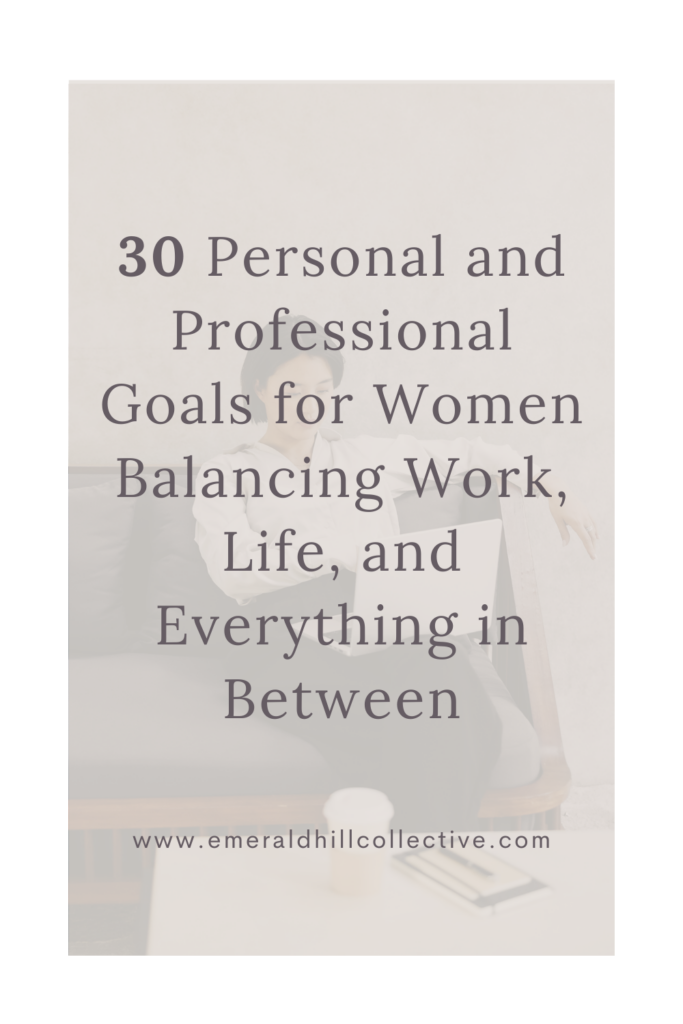
Balancing work, side gigs, hobbies, and life can feel like juggling flaming swords. It’s impressive if you can pull it off, but exhausting and risky when things go awry. This is where personal development comes in. Think of personal development as the secret sauce transforming “just getting by” into “living your best life.”
In this post, you’ll discover 30 personal development examples that will help you shine both at work and in life. They’re practical, actionable steps tailored for busy women like you! Whether you’re aiming to boost your confidence, improve your productivity, or incorporate the art of work-life balance, there’s something here to explore.
30 Personal Development Examples to Help You Thrive at Work and in Life
This post may contain affiliate links, which means I’ll receive a commission if you purchase through my links, at no extra cost to you. Please read the full disclosure for more information.
Save this post for later in Pinterest!
Why Personal Development Matters
Life can feel like a treadmill. You’re working hard to keep up with deadlines, side gigs, and quality time with loved ones, yet you’re not moving forward. Personal development isn’t about stepping off the treadmill. It’s about learning how to run smarter and not harder.
Investing in personal growth creates a butterfly effect. Improving one skill, like communication at work, often enhances relationships and overall well-being. A study in The Journal of Positive Psychology found that setting personal development goals leads to greater life satisfaction and resilience. And for women balancing career ambitions with personal fulfillment, growth is essential.
Personal development matters because it isn’t about perfection. It’s about moving towards a better version of yourself, one step at a time.

Image: Styled Stock Society
30 Personal Development Examples to Help You Thrive in Work and Life
Personal development isn’t one-size-fits-all. The goals you set for yourself should fit into your lifestyle. To help you out, I have categorized 30 practical examples to help you grow both at work and in life, complete with actionable advice to get started!
Professional Growth Examples
1. Improve Time Management
“When you focus on what you do best and what you enjoy most, you can begin to build the life you want within the time you’ve got.”
– Laura Vanderkam, 168 Hours: You Have More Time Than You Think
Mastering time management helps you prioritize your tasks, avoid burnout, and make room for what truly matters—whether that’s crushing a work deadline or enjoying a guilt-free Netflix binge. Research published in Harvard Business Review shows that effective time management leads to higher job satisfaction and better work-life balance.
Actionable advice
- Use the Eisenhower Matrix: Categorize tasks into urgent/important, important/not urgent, etc., to focus on priorities.
- Batch Similar Tasks: Group similar activities (like emails or admin work) to minimize context-switching.
- Try Time-Blocking: Allocate specific blocks of time for tasks to avoid overcommitting and stay on track.
Related: 7 Simple Yet Mighty Time Management Strategies for the Busy Woman
2. Develop Leadership Skills
“Leadership is not about being in charge. It is about taking care of those in your charge.”
– Simon Sinek
Emotional intelligence (EQ) is the secret sauce to building stronger relationships, both professionally and personally. According to a study by TalentSmart, 90% of top performers have high emotional intelligence. Even more, a study in the Harvard Business Review shows that women who demonstrate leadership traits are 2.5 times more likely to advance in their careers.
Actionable advice
- Practice Self-Awareness: Keep a journal to reflect on your emotions and triggers.
- Empathize Actively: Listen without interrupting and try to understand others’ perspectives before responding.
- Learn to Regulate Emotions: Use techniques like deep breathing or pausing before reacting to stressful situations.
Download my free list of 83 journaling prompts!
3. Master Communication
Clear communication can make or break your professional relationships. Whether it’s crafting a concise email or presenting in a meeting, honing this skill will elevate your career. Crucial Conversations by Joseph Grenny, Kerry Patterson, and Ron McMillan offers strategies for navigating high-stakes conversations.
Actionable advice
- Practice Active Listening: During meetings, focus solely on the speaker without multitasking.
- Paraphrase for Clarity: Summarize what others say to confirm your understanding before responding.
- Refine Your Writing: Use tools like Grammarly to ensure your written communication is professional and clear.
4. Learn Public Speaking
Public speaking is one of the most feared yet transformative skills. Speaking confidently in front of others can set you apart in the workplace. Warren Buffett famously said,
“You can improve your value by 50 percent just by learning communication skills like public speaking.”
– warren Buffet
Actionable advice
- Join Toastmasters: A supportive community to practice and refine your public speaking skills.
- Start Small: Begin by presenting ideas in team meetings or smaller groups.
- Record Yourself: Practice presentations and review recordings to identify areas for improvement.
5. Build Emotional Intelligence (EQ)
Emotional intelligence (EQ) is the ability to understand and manage your emotions while empathizing with others. Understanding your and others’ emotions helps you navigate tricky workplace dynamics.
Actionable advice
- Journal Your Triggers: Reflect on emotional triggers and how you typically respond to them.
- Practice Empathy: Ask open-ended questions to better understand others’ perspectives.
- Regulate Emotions: Use deep breathing or mindfulness techniques to stay calm in stressful situations.
Related: Journaling for Self Improvement Made Easy with 83 FREE Prompts

6. Be Proactive
Proactivity means anticipating problems and acting before they escalate. As Stephen Covey writes in The 7 Habits of Highly Effective People:
“Proactive people focus on things they can do something about. The nature of their energy is positive, enlarging, and magnifying, causing their Circle of Influence to increase.”
– Stephen Covey, The 7 Habits of Highly Effective People:
Anticipating challenges and taking initiative can make you an invaluable team member.
Actionable advice
- Solve Before You’re Asked: Each morning, identify one problem you can solve without being prompted.
- Focus on Recurring Issues: Pinpoint areas of inefficiency or recurring challenges and propose solutions.
- Create a Plan: Break big problems into actionable steps to tackle them effectively.
7. Manage Stress at Work
Stress is unavoidable, but how you handle it matters. Managing stress at work is incredibly important because chronic stress can lead to burnout and health issues.
Actionable advice
- Step Away: Dedicate five minutes daily to step away from your desk, breathe, or take a short walk.
- Practice Deep Breathing: Try the 4-7-8 technique: inhale for 4 counts, hold for 7, and exhale for 8.
- Keep a Gratitude List: Reflect on three things you’re grateful for each day to shift your focus to the positive.
8. Resolve Conflict Effectively
Conflict is inevitable, but resolution is a skill. Handling workplace conflicts with grace can strengthen team relationships.
Actionable advice
- Focus on the Issue, Not the Person: Use “I” statements to express your feelings (e.g., “I feel…” instead of “You always…”).
- Stay Solution-Oriented: Identify common ground and work toward mutually beneficial outcomes.
- Take Time to Cool Down: When emotions run high, pause before addressing the conflict.
9. Adapt to Change
In today’s fast-paced work environment, adaptability is crucial. A report by McKinsey highlights that agile workers are more likely to thrive during organizational changes.
Actionable advice
- Reframe the Situation: List the potential positives and opportunities a change presents.
- Focus on What You Can Control: Direct your energy toward aspects of the situation you can influence.
- Stay Curious: Ask questions and seek to understand the reasons behind the change.
10. Increase Productivity
Being efficient frees up time for the things that truly matter. Use the 80/20 rule (Pareto Principle) to take advantage of your limited time and increase your productivity by finding activities that take 20% of your effort but help achieve 80% of your results.
Actionable advice
- Identify High-Impact Tasks: Focus on completing the tasks that drive the most significant results.
- Work in Focused Blocks: Use techniques like the Pomodoro method to maintain deep concentration.
- Learn to minimize distractions: Cal Newport’s Deep Work provides insight into minimizing distractions, maximizing your time, and achieving peak productivity.

Image: Styled Stock Society
Personal Growth Examples
11. Wake Up Earlier
Early mornings often provide the quiet, focused time needed for self-reflection or tackling big goals. The quiet morning hours are perfect for reflection, planning, or self-care. Benjamin Spall’s My Morning Routine shares insights from successful people’s morning habits.
Actionable advice
- Ease Into It: Wake up 10 minutes earlier each week until you reach your ideal wake-up time.
- Create a Morning Ritual: Start with small habits, like stretching, meditating, or reviewing your to-do list.
- Avoid the Snooze Button: Place your alarm across the room to get out of bed immediately.
Related: 8 Amazingly Simple Self Improvement Tips to Get Your Life On Track
12. Develop Resilience
Resilience is your ability to bounce back from setbacks. Life throws curveballs, but resilience helps you bounce back stronger. Angela Duckworth’s book Grit explains how passion and perseverance lead to success – more so than pure talent!
Actionable advice
- Reframe Failures: Ask yourself, “What did I learn from this?” or “How can this help me grow?”
- Practice Self-Compassion: Be kind to yourself when things go wrong—treat yourself as you would a close friend.
- Build a Support System: Surround yourself with positive people who encourage you to persevere.
13. Boost Confidence
Confidence grows when you step outside your comfort zone and helps you seize opportunities while advocating for yourself. Confidence inspires trust, enhances your presence, and empowers you to tackle challenges head-on.
“Confidence comes not from always being right but from not fearing to be wrong.”
– Peter T. McIntyre
Actionable advice
- Celebrate Small Wins: Acknowledge daily achievements, no matter how minor they seem.
- Challenge Negative Self-Talk: Replace “I can’t do this” with “I’ll give it my best shot.”
- Practice Power Poses: Stand tall, maintain eye contact, and smile to boost your self-assurance.
14. Cultivate Empathy
Empathy deepens connections and helps you understand different perspectives. Brené Brown in The Gifts of Imperfection emphasizes,
“Empathy is feeling with people.”
– Brené Brown, The Gifts of Imperfection
Actionable advice
- Ask Thoughtful Questions: During conversations, inquire about others’ feelings and perspectives.
- Listen Without Interrupting: Focus on understanding, rather than planning your response.
- Practice Perspective-Taking: Imagine yourself in someone else’s situation to better relate to their experience.
15. Set and Maintain Boundaries
Healthy boundaries are your secret weapon for protecting your time, energy, and mental health. Without them, you risk overcommitting, burning out, or feeling resentful toward others. Boundaries empower you to prioritize what matters, ensuring you’re not running on empty.
“You get what you tolerate. If you don’t set boundaries for yourself, others will.”
– Dr. Henry Cloud, Boundaries
Actionable advice
- Learn to Say No: Politely decline requests when your schedule is full.
- Communicate Clearly: Express your limits respectfully, such as, “I’m unavailable after 6 PM.”
- Use a Time Buffer: Block off personal time in your calendar to prevent overbooking.

Image: Styled Stock Society
16. Improve Relationships
Strong relationships enrich your life with support, joy, and purpose. Investing in relationships enhances your mental health, reduces stress, and provides a sense of belonging.
Actionable advice
- Schedule Quality Time: Dedicate uninterrupted time for loved ones, whether it’s a quick coffee date or a video call.
- Show Appreciation: Express gratitude through thoughtful gestures or kind words.
- Be Present: Put away distractions and fully engage during conversations.
17. Practice Active Listening
Active listening is about fully focusing on the speaker, understanding their message, and responding thoughtfully. Listening well shows others you value their input, strengthens relationships, and reduces misunderstandings.
Actionable advice
- Paraphrase to Confirm: Repeat back what you hear to show you understand and stay engaged.
- Avoid Interrupting: Let the speaker finish before sharing your perspective.
- Use Nonverbal Cues: Nod, maintain eye contact, and lean slightly forward to show you’re paying attention.
18. Explore a Hobby
Hobbies provide a creative outlet, reduce stress, and add joy to your life. They also help you develop new skills and interests, keeping life exciting and fulfilling. Engaging in hobbies boosts your mental health, sparks creativity, and creates opportunities for social connections.
Actionable advice
- Try Something New: Explore activities like pottery, photography, or salsa dancing to discover your passion.
- Set Aside Time: Dedicate at least an hour a week to your chosen hobby.
- Join a Community: Find local or online groups to connect with others who share your interests.
19. Learn a New Skill
Lifelong learning keeps your brain sharp, enhances your career prospects, and opens doors to exciting opportunities. It’s an investment in yourself that pays dividends in both your personal and professional life.
Actionable advice
- Use Online Platforms: Explore affordable courses on platforms like Udemy, Coursera, or LinkedIn Learning.
- Apply Immediately: Practice your new skill as you learn to reinforce knowledge. For example, cook a recipe after watching a cooking class.
- Set Realistic Goals: Break the skill into manageable milestones to maintain motivation, such as learning 10 new phrases weekly if studying a language.

Image: Styled Stock Society
Hybrid Examples (Work and Life)
21. Create a Work-Life Balance Plan
Achieving a balance between work and personal life isn’t just about avoiding burnout; it’s about living a fulfilling and manageable life. By creating balance, you improve your mental health, boost productivity, and make time for what truly matters.
Actionable advice
- Schedule Downtime: Treat self-care and relaxation as non-negotiable appointments in your calendar.
- Set Clear Boundaries: Avoid checking work emails after hours or during personal time.
- Prioritize Quality Over Quantity: Focus on meaningful activities rather than filling your schedule.
Related: 8 Amazingly Simple Self Improvement Tips to Get Your Life On Track
22. Improve Decision-Making Skills
Good decision-making reduces stress, saves time, and helps you achieve better outcomes in both work and life. Learning to make thoughtful choices prevents unnecessary frustration and improves confidence.
Actionable advice
- Use Decision-Making Frameworks: Try the Eisenhower Matrix to prioritize decisions by urgency and importance.
- Gather Information: Weigh the pros and cons of each option before deciding.
- Limit Overthinking: Set a time limit for making decisions to avoid analysis paralysis.
23. Grow Your Network
A strong network can open doors to new career opportunities, provide mentorship, and offer personal support. Building meaningful connections helps you learn, grow, and navigate challenges with the support of others.
Actionable advice
- Attend Industry Events: Look for conferences, workshops, or meetups in your field.
- Engage on LinkedIn: Join professional groups, comment on posts, and share valuable insights.
- Be Intentional: Focus on quality connections rather than the quantity of people you meet.
24. Develop a Growth Mindset
A growth mindset helps you view challenges as opportunities and believe in your ability to improve. As Carol Dweck explains in Mindset: The New Psychology of Success
“The view you adopt for yourself profoundly affects the way you lead your life.”
Carol Dweck, Mindset: The New Psychology of Success
Actionable advice
- Reframe Your Thoughts: Replace “I can’t” with “I can learn how.”
- Embrace Challenges: See difficulties as opportunities to grow rather than threats.
- Learn Continuously: Take on new tasks that stretch your abilities, even if they feel uncomfortable.
25. Embrace Feedback Gracefully
Feedback is a powerful tool for personal and professional growth, but only if you approach it with an open mind. Constructive feedback helps you identify blind spots, improve skills, and foster stronger relationships.
Actionable advice
- Pause Before Reacting: Take a moment to process feedback instead of responding defensively.
- Ask Clarifying Questions: Use feedback sessions as opportunities to gain deeper insights.
- Act on It: Develop a plan to address the feedback and track your progress.

Image: Styled Stock Society
26. Master Stress Management Techniques
Chronic stress impacts your mental and physical health. Managing stress creates space for clarity, resilience, and better decision-making. Stress is inevitable, but managing it effectively helps you stay calm, focused, and productive.
Actionable advice
- Incorporate Mindfulness: Practice meditation or deep breathing exercises daily.
- Try Yoga or Stretching: Physical movement helps reduce tension and improve mood.
- Unplug Regularly: Take short breaks away from screens to recharge.
27. Be More Assertive
Assertiveness allows you to express your needs and opinions confidently while respecting others. Advocating for yourself improves relationships, prevents resentment, and ensures your voice is heard.
Actionable advice
- Use “I” Statements: Say, “I feel… because…” to express your feelings and needs clearly.
- Practice Saying No: Politely decline requests that don’t align with your priorities.
- Start Small: Assert yourself in low-stakes situations to build confidence.
28. Learn to Delegate
Delegating tasks frees up your time and energy for higher-priority activities, making you more efficient and effective. You can’t do everything alone—and you shouldn’t have to. Delegation allows you to focus on your strengths while empowering others.
Actionable advice
- Start Small: Delegate one task weekly, whether at work or home.
- Be Clear: Communicate expectations and provide necessary resources for success.
- Trust Others: Let go of perfectionism and allow others to take ownership of the task.
29. Practice Gratitude
Gratitude shifts your mindset from focusing on what’s missing to appreciating what you have. It also fosters positivity, reduces stress, and improves overall well-being. Practicing gratitude is a simple yet powerful way to enhance happiness.
Actionable advice
- Keep a Gratitude Journal: Write down three things you’re grateful for each day.
- Express Appreciation: Thank someone who made your day better.
- Pause to Reflect: Take a moment to appreciate the small joys in your daily routine.
30. Celebrate Wins
Recognizing your progress, no matter how small, keeps you motivated and reinforces positive habits. Celebrating achievements helps you stay focused on your goals and builds confidence in your abilities.
Actionable advice
- Treat Yourself: Reward yourself after reaching a milestone—whether it’s a fancy coffee or a self-care day.
- Reflect on Successes: Keep a record of your wins to remind yourself of your progress.
- Share the Joy: Celebrate with friends, family, or colleagues to amplify the positive experience.
Putting Personal Growth and Development Examples into Action
Personal development isn’t about perfection—it’s about progress. Taking even the smallest steps toward improving yourself sets the stage for a more balanced, fulfilling, and confident life.
Remember, growth is a journey, not a destination. Challenges and setbacks may arise, but every obstacle is an opportunity to learn and adapt. Celebrate your wins, stay patient with yourself, and don’t forget to enjoy the process—you’re investing in the most important asset you’ll ever have: you.
So, what’s your first step? Pick one personal development goal, take action today, and watch how it transforms your life. You’ve got this!




Leave a Reply